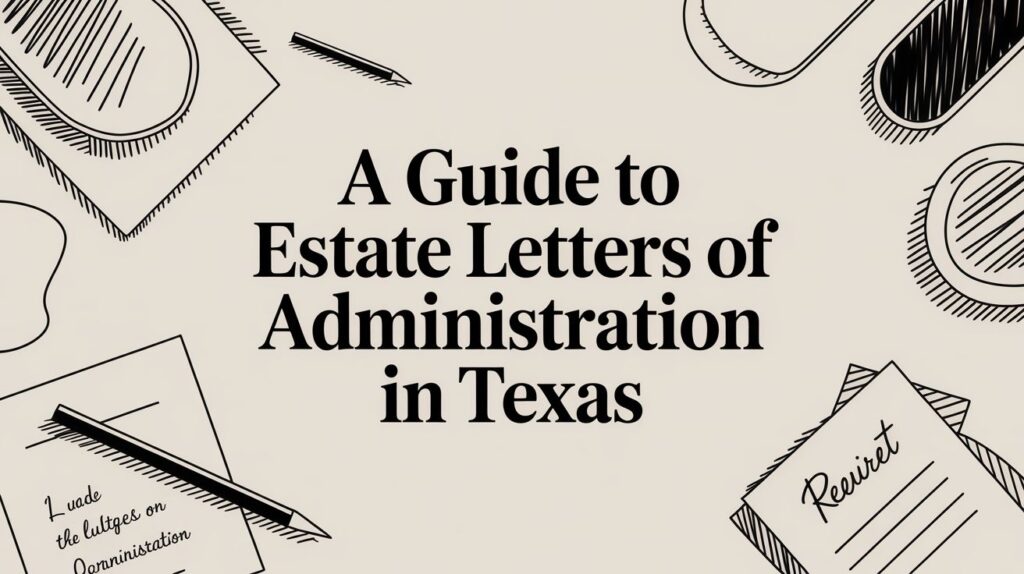If you’ve recently lost a loved one and are now responsible for handling their estate, you may be asking yourself how to file order admitting will in Texas. It’s a common and crucial question, especially for first-time executors who quickly learn that Texas probate court is more than just submitting a will and calling it a day. In reality, state law requires you to follow formal procedures to legally validate the will and begin estate administration. One of the most important steps in that process is obtaining a signed Order Admitting Will to Probate.
Whether you’re the named executor or a lawyer managing the estate, knowing how to file order admitting will in Texas can mean the difference between a seamless administration and months of unexpected delays. This guide explains every essential step—from forms to court appearances—through real-world insights, legal perspective, and practical tips you can trust.

Why Filing the Order Admitting Will Matters in Texas Probate
In Texas, probate officially begins when the court confirms a will’s validity. Once the judge is satisfied, they issue an Order Admitting Will to Probate. This document authorizes the executor to carry out the estate’s administration. Without it, you can’t access accounts, transfer titles, or pay debts on behalf of the estate.
The order is far more than paperwork—it’s the court’s approval and legal trigger for the probate process. It also acts as a prerequisite for obtaining Letters Testamentary, which banks, title companies, and agencies often demand before releasing assets.
Real-Life Example: Delays That Could’ve Been Avoided
Alan, named as the executor of his aunt’s estate in Harris County, believed having her will in hand would allow him to close her bank accounts. He confidently walked into her bank with a copy of the will, only to be denied. They informed him that until he filed for probate and secured the court’s signed Order Admitting Will to Probate, nothing could move forward. Alan spent another six weeks securing a hearing—time he could’ve saved had he known earlier how to file order admitting will in Texas.
What Is an Order Admitting Will in Texas?
An Order Admitting Will to Probate is a signed court document confirming that a submitted will meets Texas legal standards and is valid. Once the probate judge signs this order, the executor can legally act on behalf of the estate.
This critical order includes:
- The decedent’s full name and date of death
- Confirmation that the will complies with Texas probate law
- The name of the appointed executor
- The court’s directive to issue Letters Testamentary
- Authorization for the executor to carry out estate duties
Until you file and obtain this court order, even a properly executed will has no legal authority in Texas probate.
How to File Order Admitting Will in Texas: Step-by-Step Guide
Understanding how to file order admitting will in Texas means walking through the probate process from the ground up. While some counties may introduce minor differences, the foundational steps remain consistent across the state.
Step 1: File the Original Will with the Probate Court
Begin by filing the original (not a copy) of the will in theprobate court located in the county where the deceased lived. Under Texas law, you must file within four years of the person’s death. If you miss this deadline, you risk losing the will’s validity and triggering intestate succession instead.
You’ll need:
- The original will
- An Application for Probate
- A filing fee (usually between $300–$400, depending on the county)
If you’re uncertain about which court to contact, check with the county clerk. In major counties like Bexar or Travis, a statutory probate court handles these filings exclusively.
Step 2: Schedule and Attend the Probate Hearing
After you file the application and will, the court will assign a hearing date. Texas law mandates a waiting period of at least 10 days after public notice is posted before this hearing can take place. The notice provides potential heirs or interested parties an opportunity to object to the will’s admission.
At the hearing, you (or your attorney) will present the will and demonstrate that:
- The deceased passed away with a valid will
- The will satisfies Texas legal requirements (such as proper signatures and witnesses)
- You qualify to serve as executor
- The estate meets criteria for probate in Texas
While contested wills do complicate matters, most hearings for simple estates proceed quickly when paperwork is in order.

Step 3: Submit the Order Admitting Will to Probate
This is the central step in the process. You must bring a completed proposed Order Admitting Will to Probate to the court. Although some counties offer templates, it’s your responsibility to personalize the document with the correct case information.
The order should:
- Match names and dates listed in the application
- Include the judge’s finding that the will is valid
- Name the executor and direct the court clerk to issue Letters Testamentary
Once the judge signs this order, the probate process is officially underway. Always bring additional copies—financial institutions will often ask for certified versions.
Step 4: Obtain Letters Testamentary
After receiving the signed order, the county clerk will issue Letters Testamentary. These documents grant you legal authority to:
- Access and manage bank accounts
- Sell or transfer real property
- Pay taxes and creditors
- Distribute property to heirs
Most executors request multiple certified copies (typically $2–$10 each) to streamline dealings with various financial and legal institutions.
Forms Required to File Order Admitting Will in Texas
Successfully understanding how to file order admitting will in Texas also means preparing and submitting the correct paperwork. The following forms are essential:
- Application for Probate of Will and Issuance of Letters Testamentary
- Proof of Death and Other Facts (typically an affidavit or sworn testimony)
- Proposed Order Admitting Will to Probate
- Oath of Executor (submitted after the order is signed)
- Inventory, Appraisement, and List of Claims (must be filed within 90 days of appointment)
Every form must be filled out completely, accurately, and in compliance with local rules. Even small errors—like misspelled names or mismatched dates—can delay your hearing or force a re-filing.
Real-Life Tip: Check County-Specific Requirements
Each Texas county may impose unique formatting rules or require additional supporting documents. For example, Travis County mandates a specific paragraph structure for orders. Always visit the court’s website or speak with the probate clerk in your county before filing.
What Happens If You Don’t File the Order Correctly?
Submitting an incorrect or incomplete Order Admitting Will to Probate can derail your entire timeline. You could face:
- Delays in obtaining Letters Testamentary
- Rejected filings that require court corrections or amendments
- Missed deadlines for inventory or tax obligations
- Increased friction between family members or heirs

In contested estates, the failure to file properly may result in the judge rejecting the will altogether. Understanding how to file order admitting will in Texas accurately helps prevent unnecessary complications. A seemingly minor oversight on a form can snowball into a full-scale delay or even litigation.
Can You File Without an Attorney?
Yes, individuals can represent themselves when filing probate paperwork in Texas, also known as pro se filing. This route may work for small, uncontested estates with straightforward assets. Still, keep in mind that probate law includes technical steps, and one mistake could invalidate the will’s admission. If the wrong language or form is used, you may be forced to start over or attend additional hearings.
Why Hiring a Lawyer Can Help
Hiring a probate attorney ensures:
- Proper filing of every document
- Fewer chances of delay or court rejection
- Informed advice regarding debts, taxes, and disputes
- Confidence in navigating court appearances
Even if you handle much of the process on your own, many executors hire a lawyer to draft or review the Order Admitting Will to Probate, simply because of its legal significance. The peace of mind you gain can outweigh the upfront legal fees, especially if disputes or unfamiliar terms arise.
When Is Muniment of Title a Better Option?
In some circumstances, you may not need full probate. If the deceased left a valid will, had no outstanding debts (other than a mortgage), and the estate is simple, you may qualify for a Muniment of Title process instead.
Benefits of Muniment of Title:
- No executor is appointed
- No Letters Testamentary required
- No inventory or appraisement filings
- Faster and more affordable
- Ideal for transferring real estate
Even with Muniment of Title, the court must still approve the will, so learning how to file order admitting will in Texas is necessary regardless of which path you take. The document filing requirements remain essential, even if the process itself is more streamlined.

Final Thoughts: Filing with Confidence
When you’re in charge of a loved one’s estate, understanding how to file order admitting will in Texas can help you navigate the legal system with less stress and greater confidence. Each step—from filing the application and attending the hearing to submitting the proposed order and obtaining Letters Testamentary—plays a vital role in honoring the decedent’s wishes and closing their affairs responsibly.
Take the time to prepare thoroughly. Double-check your forms, confirm court-specific requirements, and don’t hesitate to consult with a probate attorney if needed. Filing an Order Admitting Will to Probate isn’t just a legal task—it’s a meaningful way to carry out the final chapter of someone’s life with care and precision.








